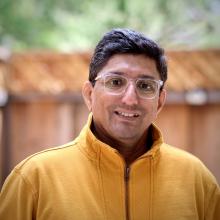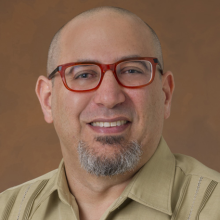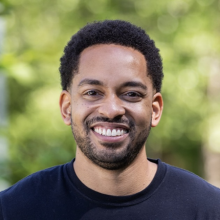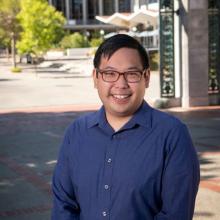Past Seminars
The HCII Seminar Series has been a weekly tradition at CMU since 1990. Details of our seminars from 2014 to present, as well as many of their recordings, are available below. A few years ago, we held a year of special programming in celebration of the seminar's 25th anniversary.
| Date | Title | Speaker | Talk title and Abstract |
|---|---|---|---|
| HCII Seminar Series - Na Du |
Na Du Assistant Professor in the Department of Informatics and Networked Systems, School of Computing and Information at the University of Pittsburgh |
"Towards Situation-Aware and Trustworthy Technologies for Human-Agent Teaming" Emerging autonomous technologies like automated vehicles, robots, and drones, must amplify human capabilities and partner reliably with people in safety-critical settings such as transportation,… Full Details |
|
| HCII Seminar Series - Aditya Vashistha |
Aditya Vashistha Assistant Professor of Computing and Information Science at Cornell University |
"Towards Globally Equitable AI" AI has the power to drive meaningful change, but its benefits have remained concentrated among privileged communities in the West, which account for only a small fraction of the global population. Even conversations about AI risks are rooted in Western… Full Details |
|
| HCII Seminar Series - Alex Mariakakis |
Alex Mariakakis Assistant Professor, Department of Computer Science, University of Toronto |
"Embracing Ubiquitous Technology to Complement, Scale, and Extend Traditional Healthcare" Traditional healthcare is centered around face-to-face interactions between patients and clinicians. While these human relationships are important for establishing empathetic and ethical care… Full Details |
|
| HCII Seminar Series - David Gagnon |
David Gagnon Scientist III, Wisconsin Center for Education Research, University of Wisconsin - Madison |
"Developing a New Public Media and Open Research Platform with Video Games" Joan Cooney and her contemporaries transformed 1970s television into a platform for public education and inclusion. Programs such as Sesame Street coordinated designers, artists and researchers to not only… Full Details |
|
| HCII Seminar Series - Abhijit Thosar |
Abhijit Thosar Head of Research and Design |
"Designing with AI: The Next Frontier in Human-AI Collaboration" Abhijit Thosar, a seasoned design leader, invites students to explore how Agentic AI is reshaping how we design digital systems. As AI shifts from passive tools to autonomous agents, Human-Computer Interaction enters… Full Details |
|
| HCII Seminar Series - Lisa Anthony |
Lisa Anthony Associate Professor, Department of CISE, University of Florida |
* TALK POSTPONED - Will be rescheduled at a later date *
"Mentoring as a Way of Life: Scholarship in a Post-LLM World" The role of the teacher-scholar includes a significant component of mentoring junior students or colleagues to become… Full Details |
|
| HCII Seminar Series - Michael Bernstein |
Michael Bernstein Associate Professor, Computer Science, Stanford University |
Sujeath Pareddy Memorial Lecture Sujeath Pareddy was a PhD student in the Human-Computer Interaction Institute from 2018 to 2022. He brought his passion for computing systems and physics to bear on hard, long-standing challenges in accessibility for people with… Full Details |
|
| HCII Seminar Series - Kathleen Mercury |
Kathleen Mercury Lecturer, Cal Poly Humboldt School of Education |
"CreAItivity: The Creative Process, AI, and the Place Between" The role of AI in the creative process is a difficult prospect for many people in creative… Full Details |
|
| HCII Seminar Series - David Widder |
David Widder Postdoctoral Fellow at the Digital Life Initiative at Cornell Tech |
"AI Supply Chains: Tools to Locate Power and Responsibility in AI Production for Critical, Accountable Computing" Contemporary AI production is structured to enable ignorance of harm for those who want it, and complicate resistance for those who don’t. Through case studies of the… Full Details |
|
| Special HCII Seminar - Scott Davidoff |
Scott Davidoff Principal Research Scientist, NASA Jet Propulsion Laboratory |
"HCI and the Search for Life in the Universe" The biggest science questions – like whether life arose multiple times in the universe – are profoundly team efforts, even though many of our scientific tools and customs are oriented around disciplinary silos. This talk will describe… Full Details |
|
| HCII Seminar Series - Byungjoo Lee |
Byungjoo Lee Mechanical Engineer and Associate Professor in the Department of Computer Science,Yonsei University, Seoul, South Korea |
"A Decade of Research on Interaction Under Time-Pressure: Key Insights and Future Directions" Research on time-pressured interactions in the history of HCI has been surprisingly scarce. In this talk, I will present a decade of my research, arguing that the rapid growth of related… Full Details |
|
| HCII Seminar Series - Gary Hsieh |
Gary Hsieh Associate Professor in Human Centered Design & Engineering at University of Washington |
"Accelerating Research Translation into Design Practice Using Generative AI" Many valuable insights embedded in scientific publications are siloed and rarely translated into results that can directly benefit humans. This contributes to the so-called research-practice gaps, impedes… Full Details |
|
| HCII Seminar Series - Misha Sra |
Misha Sra John and Eileen Gerngross Assistant Professor at the University of California, Santa Barbara |
"Design of Human-AI Systems to Augment Human Potential" At the Human-AI Integration Lab (HAL), we design, build, and study human-AI systems that amplify human potential by enhancing cognitive, creative, physical, and social capabilities. This talk will explore the challenges of… Full Details |
|
| Special HCII Seminar Series - Nick Hobbs |
Nick Hobbs Designer, New Generative AI Products, Google |
"How to Build a New Generation of AI Native Products" We’ve seen an explosion of investment in AI infrastructure and foundation models, yet a commensurate surge of popular AI products has yet to follow. In this talk, we’ll explain the dearth of existing products, examine building… Full Details |
|
| HCII Seminar Series - Chris Golias |
Chris Golias Senior User Experience Researcher, Gemini Internationalization, Google |
"Decolonizing LLMs: An Ethnographic Framework for AI in African Contexts" We examine LLM deployment through African lenses, utilizing and reflecting on ethnographic methods to engage with the continent’s unique technolinguistic landscape. Drawing from primary research in Ethiopia… Full Details |
|
| HCII Seminar Series - Dan Russell |
Dan Russell Adjunct Lecturer, Human AI Group, Computer Science Department, Stanford University |
"People and Online Research, Now That They’re Doing AI" Given all of the press that LLMs have garnered, it’s worthwhile asking if they’re changing the ways people find information. Are LLMs pulling traffic away from the search engines? Just as importantly, how do… Full Details |
|
| HCII Seminar Series - Mark Riedl |
Mark Riedl Professor, Georgia Tech School of Interactive Computing, and Associate Director of the Georgia Tech Machine Learning Center |
"Human-Centered Explainable AI" Artificial intelligence systems are increasingly involved in high-stakes decision-making, such as healthcare, financial, and educational determinations. Many have called for explainable AI (XAI), which are AI systems that provide human-… Full Details |
|
| Special HCII Seminar - Ujwal Gadiraju |
Ujwal Gadiraju Assistant Professor, Human-Centered AI and Crowd Computing, Software Technology Department, Delft University of Technology |
"The Human Quotient for Better AI Systems" The unprecedented rise in the adoption of artificial intelligence techniques and automation in many contexts is concomitant with the shortcomings of such technology concerning robustness, interpretability, usability, trustworthiness… Full Details |
|
| HCII Seminar Series - James Landay |
James Landay Professor of Computer Science and the Anand Rajaraman and Venky Harinarayan Professor in the School of Engineering at Stanford University |
“AI For Good” Isn’t Good Enough: A Call for Human-Centered AI AI for Good initiatives recognize the potential impacts of AI systems on humans and societies. However, simply recognizing these impacts is not enough. To be truly Human-Centered, AI development must be user-… Full Details |
|
| HCII Seminar Series - Martez Mott |
Martez Mott Senior Researcher, Ability Team, Microsoft Research Redmond |
"Designing Accessible Virtual Reality Experiences for People with Limited Mobility" Virtual Reality (VR) offers compelling ways for people to interact with digital content in various domains such as education, gaming, communication, and design. However, VR platforms can be… Full Details |
|
| ACM Distinguished Speaker and HCII Special Presentation - Ronald Baecker |
Ronald Baecker Emeritus Professor of Computer Science, University of Toronto |
"Digital Dreams Have Become Nightmares: What We Must Do -- A Call to Action" For 80 years, digital technology visionaries have imagined and created systems to support human knowledge, learning, creativity, medicine, health, communications, community, commerce, power, and… Full Details |
|
| HCII Seminar Series - Takahiro Yabe |
Takahiro Yabe Assistant Professor, Department of Technology Management and Innovation (TMI), Center for Urban Science and Progress (CUSP), Tandon School of Engineering, New York University |
"Understanding the Complexity of Social Interactions at the City Scale" The quantity and quality of social encounters in urban environments are crucial elements that drive economic mobility and build social capital. Where in cities do we observe the most and least diversity in… Full Details |
|
| HCII Seminar Series - Loren Terveen |
Loren Terveen Distinguished McKnight University Professor, Computer Science & Engineering, The University of Minnesota |
"Wikipedia as a Social Computing Laboratory: 20 Years of Research (and Counting)" I’ve been doing research in Wikipedia for almost 20 years. It has been a laboratory where my collaborators and I have studied the social dynamics of the peer production of knowledge and introduced a… Full Details |
|
| HCII Seminar Series - Michael Madaio |
Michael Madaio Senior Research Scientist, Google Research |
"Responsible AI (h)as a Learning and Design Problem" To address the potential harms of AI systems, prior work has developed resources (e.g., toolkits) to support responsible AI (RAI) development and studied how AI practitioners use such resources in their development practices.… Full Details |
|
| HCII Seminar Series - Rosa Arriaga |
Rosa Arriaga Associate Professor in the School of Interactive Computing at Georgia Tech |
"Forms of Accountability at the Intersection of Science and Design: Implications for Health and Wellness Technologies" Computing holds the promise of alleviating the negative impact of chronic disease and mental health disorders by scaling human effort over time and space. Four in… Full Details |
|
| Invited Talk with Yudai Tanaka |
Yudai Tanaka PhD student in the Department of Computer Science at University of Chicago |
"Intercepting User’s Brain and Nervous System: A New Paradigm for Haptic Output" When outputting information to our senses, almost all wearable interfaces follow the same principle: externally generating stimuli (e.g., lights, sounds, vibrations) and then presenting them via… Full Details |
|
| HCII Seminar Series - Chris Laffra |
Chris Laffra founder of PySheets |
"Creativity, Productivity and Communication" Before AI showed up, software engineers spent only 20-30 percent of their time coding, with the remaining time dedicated to discussing their code. With the AI revolution, stakeholders expect that ratio to decrease even more. Therefore,… Full Details |
|
| HCII Seminar Series -Antti Oulasvirta |
Antti Oulasvirta Professor, Aalto University, School of Electrical Engineering |
"Towards Artificial Users: Rethinking Predictive Modeling in HCI in the Era of ML" Predictive models are used to infer users’ preferences, predict behavior, and generate and adapt user interfaces. Such models are hard to create, however, fundamentally because human behavior… Full Details |
|
| HCII Seminar Series - Leilani Battle |
Leilani Battle Assistant Professor in the Paul G. Allen School of Computer Science and Engineering at the University of Washington and co-director of the UW Interactive Data Lab |
"Behavior-Driven Optimization for Interactive Data Exploration" Analysts need the ability to intuitively explore their data before deciding how to clean it, model it, and present it to key decision makers. With the abundance of massive datasets in industry and science, analysts… Full Details |
|
| HCII Seminar Series - Richmond Wong |
Richmond Wong Assistant Professor, Digital Media, School of Literature Media & Communication, Georgia Tech |
"Creating Ethics Infrastructures for Design" Design is a social and cultural practice (as well as a technical one). Developing ethical systems requires more than creating technical ethical design tools for individual designers; it also requires consideration of social and cultural… Full Details |






























